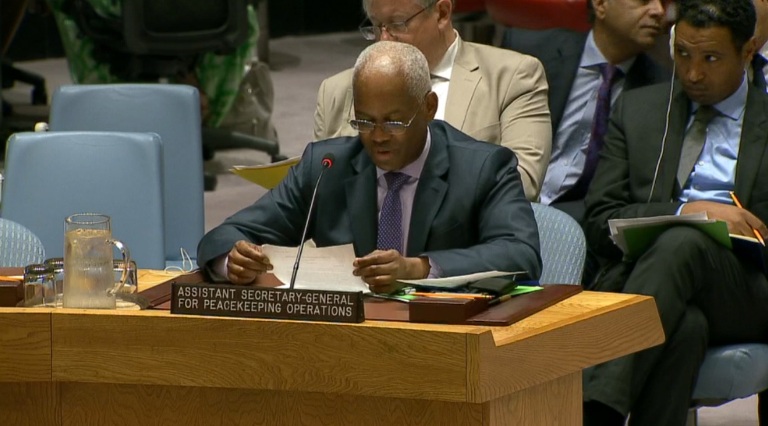S. Sudan’s SPLA controls Pagak but fighting continues in surrounding areas: UN

August 24, 2017 (WASHINGTON) – A senior United Nations peacekeeping official Thursday told the UN Security Council that the government forces have controlled the rebel headquarters near the border with Ethiopia.
The statements put an end to the conflicting reports from the two warring sides in South Sudan as they both claim the control of Pagak since the 7th August when the government forces attacked the rebel stronghold of the border town.
UN Assistant Secretary-General for Peacekeeping Operations, El Ghassim Wane, said the security situation in the Upper Nile region remains a source of “serious concern”.
“While efforts by the SPLA to take Pagak, the SPLA-IO de facto headquarters, initially succeeded, fighting around Pagak and along the corridor to Mathiang continues and civilians in the area remain displaced including some flow of refugees to Ethiopia,” Wane said.
He added that clashes resumed between the SPLA and the rebel SPLA-IO in Kaka, on the west bank of the Nile. Also, he said insecurity continues in Equatoria region where rebel fighters loyal to the former First Vice President fight against the government forces.
Such incidents directly affected the humanitarian operations to reach, in particular, the most vulnerable civilians who are dire need of assistance, he said.
Wane further disclosed that some progress had been reported in the negotiations related to the establishment of the South Sudan Hybrid Court, with the Government and the African Union Commission recently agreeing, on the technical level, to the text of its legal instruments.
South Sudanese Ambassador Akuei Bona Malwal (South Sudan) reiterated before the Security Council meeting that his government had not and never would hinder or impede access to any humanitarian organisation to civilians in the war-affected areas.
He commended the Government of Ethiopia for their prompt action to hold security meetings and discourage those who had sought refuge across the border from using it as a launching pad for attacks in South Sudan.
Regarding the Regional Protection Force, his Government had agreed to work closely with the United Nations, African Union and IGAD for the smooth implementation and operationalization of the mandate of those troops in South Sudan.
The 15-member body in a meeting chaired by the Egyptian ambassador was also briefed via video-conference by Nicholas Haysom, Special Envoy of the Secretary-General for Sudan and South Sudan, and Festus Mogae, Chairperson of the Joint Monitoring and Evaluation Commission.
PEACE REVITALIZATION FORUM
Speaking about the revitalization process decided by the IGAD countries, Mogae recalled that peace forum had been established with three objectives: first, implementing the ceasefire agreement; second, overseeing the full and inclusive implementation of the Peace Agreement; and third, establishing a revised and realistic timeline for elections in South Sudan.
However, those outcomes were “not predetermined”, and it was up to the parties to commit to those goals, he stressed.
However, “we must speak with one voice” to the country’s leaders, put in place clear consequences for spoilers and secure adequate financing for the revitalization process, he added.
(ST)

